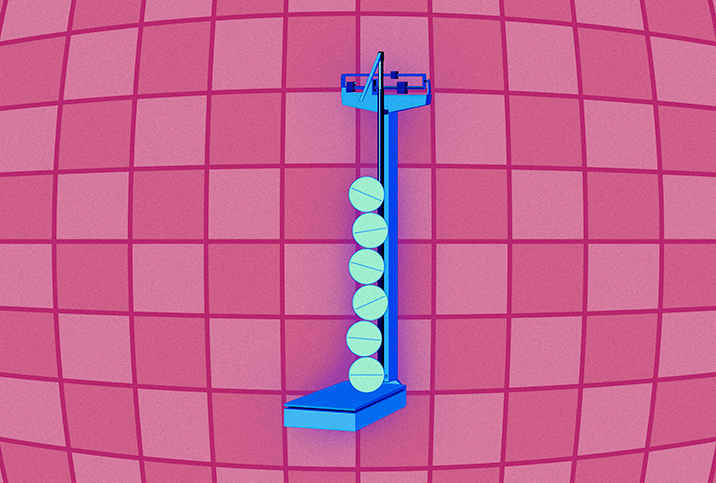How Your Doctor Recommends the Right Birth Control for You

Birth control comes in many different forms, from pills and shots to patches and IUDs. It can be hard to navigate the waters and find a birth control that ticks all of the right boxes for you.
Tara Scott, M.D., who is board-certified in OB-GYN, functional medicine and integrative medicine, explained there are several factors to take into consideration when choosing the right birth control. How long you plan to stay on contraception, your medical history, and whether or not you are monogamous and need protection against STIs are all things that come into play.
"If someone is completely new to birth control, they may not know what is right. In this case, they may want to do a trial of a given birth control option to assess how they feel about it and whether it works for them," said Heather Huddleston, M.D., director of the Polycystic Ovary Syndrome (PCOS) clinic at UCSF Health. "Some of the questions I might ask a patient in this situation is whether or not she thinks she could remember to take a pill every day, or whether she would prefer something that does not require this."
Speaking to your doctor can give you an insight into what options are available to you, and they can help guide you through the process.
Hormonal birth control
According to the National Survey of Family Growth (2015–2017), conducted by the Centers for Disease Control and Prevention (CDC), female sterilization was the most common contraceptive method among women ages 15 to 49 in the United States, at 18.6 percent of respondents. Oral contraceptives followed closely behind at 12.6 percent.
Many younger women opt for the combined pill, the patch or the progestin-only pill as these are convenient methods and they can immediately stop taking it if any adverse effects occur.
An implant or hormonal IUD is another effective option that is up to 99 percent effective at protecting against unwanted pregnancy, and it can be used to relieve heavy bleeding and cramping. The downside to this option is the procedure can be invasive and uncomfortable for some women. And unlike the pill, an IUD has to be removed by a healthcare professional, which can be a stressful experience.
Nonhormonal birth control
For women who experience side effects with hormonal birth control or have an ongoing health condition that can be worsened by artificial hormones, nonhormonal options should be considered instead.
The most common options are the copper IUD, condoms, cervical caps and natural family planning. There has been a surge in popularity with the copper IUD, which when inserted into the uterus produces an inflammatory response to prevent sperm from fertilizing an egg. It is 99 percent effective at preventing pregnancy and it typically presents fewer side effects compared to the hormonal coil.
However, the IUD can be expelled from the uterus or cause heavier periods and cramping. It may not be suitable for women who already suffer from heavy periods due to endometriosis or PCOS.
When is it time for a change?
Your body is always changing, and along with those changes comes the unpredictability of birth control. Even if your current birth control has been working effectively for a long period of time, it can still present problems further down the line. If you notice any of the symptoms listed below, arrange an appointment with your doctor immediately to discuss your birth control.
- Frequent fluctuations in mood
- Anxiety, irritability or depression
- Spotting
- Heavy or more painful periods
- Cramping that seems to be getting worse
- Nausea, fainting or vomiting
- Extreme bloating
- Chronic headaches
There are other reasons you might decide you want to change birth control. If you keep forgetting to take your pill, it may be time to switch to the hormonal or nonhormonal IUD for peace of mind and increased effectiveness.
For some women who have latex allergies or who have experienced problems with using condoms during sex, an alternative solution would be recommended to protect against any unwanted pregnancies.
If certain health problems arise, it may be time to reevaluate your current birth control, as it might not be the best choice for you and your body anymore. In this situation, your doctor can advise you on when to stop taking your birth control and suggest safer alternatives.
A doctor's recommendation
Whether you are new to taking birth control or you're considering changing to a method that better meets your needs and lifestyle, your doctor can help you determine what your options are.
"In my discussions about BC methods, I first consider the patient's perspective and desires. I also consider possible contraindications to given methods," Huddleston said. "For example, patients who are smokers are at more risk of blood clots when taking combined oral contraceptives, so I would steer the patient away from this option or try to convince them to quit smoking."
Other factors that a doctor considers are a person's medical history, whether they have plans for a future pregnancy, and any conditions they wish to treat, such as acne or heavy bleeding and cramping.




















